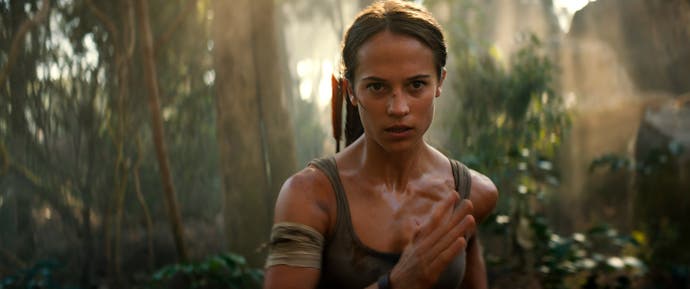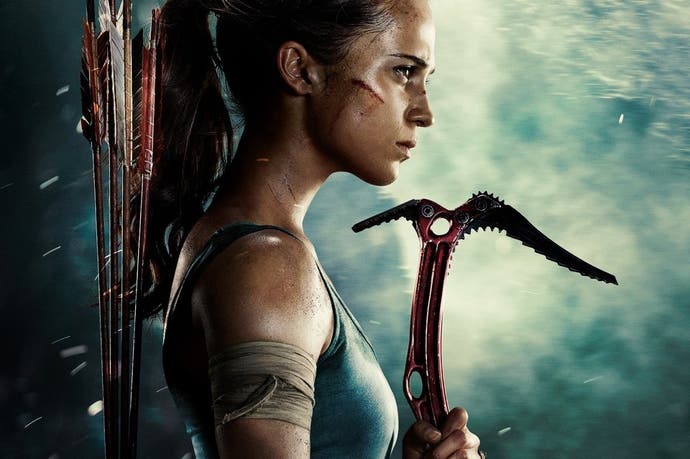Tomb Raider film review - a new kind of game-to-film failure
Gravely default.
For decades, film adaptations of video game properties have sucked - but to be fair to their beleaguered makers, they have faced some intractable problems. Early video games had great name recognition and more than their fair share of iconic imagery, but their lead characters were vacant mascots and their action often defied rational explanation, never mind motivation or plot structure. Filmmakers had to either make this stuff up as they went along, like the disastrous 1993 Super Mario Bros. film - and face the scorn of video game fans who didn't see any of what they loved on screen - or abandon any ambition to flesh out their source material and make something resembling a normal film.
You could put 2001's silly Lara Croft: Tomb Raider in the latter category. Angelina Jolie nailed Lara's original look, but the character didn't amount to more than a depthless cartoon superwoman engaged in nonsensical acrobatic capers, because that's all she had ever been. Even latterday games like Assassin's Creed, which come preloaded with the kind of tangled lore that's catnip to movie producers shopping for a future franchise, struggle to present a human dimension that scriptwriters can find purchase on. Attempts to insert one fell unsurprisingly flat.
So you can see how 2013's Tomb Raider reboot looked unusually attractive to the film world. Here was a game that bore one of the most famous names in the business - one with a bit of history to it - and yet took an expressly cinematic approach to character development. It rebuilt Lara Croft from first principles as a human being, frail and flawed, discovering her true strength for the first time. It had superb art direction as well, creating a new visual language around the character that had grit, texture and plausibility as well as grandeur (although it did owe an awful lot to the Hunger Games and Tomb Raider's upstart cousin, Uncharted).
The makers of the new Tomb Raider film that opens this weekend - who include director Roar Uthaug and screenwriters Geneva Robertson-Dworet and Alastair Siddons - clearly couldn't believe their luck. Here was an unprecedented opportunity to make a film that resembled the game it was based on and functioned as a narrative on a recognisable human scale at the same time. They haven't given this gift horse's mouth even a cursory inspection, opting for a fairly faithful adaptation of the 2013 game and sticking closely to the character as conceived by Crystal Dynamics and writer Rhianna Pratchett (until the final few frames, but more on that later).
The trouble is, they've inherited as many weaknesses from that game as they have strengths.
As played by Alicia Vikander, Lara Croft is a touch moodier and more rebellious than she appears in the game. She refuses to accept her father's apparent death on an expedition to the treacherous Japanese island of Yamatai to investigate the tomb of a cursed queen, and so doesn't sign the paperwork that would trigger her inheritance. She's making a living as a cycle courier, which allows for a gratuitous but enjoyable bike chase around the streets of London early in the movie. Eventually, she stumbles across her father's research and determines to find Yamatai herself and learn his true fate.
All this is rather laboriously relayed, without the benefit of the game's bracing cold open (or the cast of characters who accompanied Lara on her expedition, who have all been cut). Once we get to Yamatai, things proceed exactly as players of the game will expect; capture by sinister forces on the island, escape, survival, first blood, tomb raiding. In order to beef up Lara's emotional arc, the figure of her father Richard Croft (Dominic West) looms large - some of this stuff actually comes from 2015's Rise of the Tomb Raider - and in ways that may surprise you.

It's disappointing to see such a strong female lead forged in the white heat of her obsessive daddy issues. Vikander fares pretty well in the part, mind. Though very slight, she has a magnetic physical presence - taut, urgent, volatile yet controlled - and she sells the action scenes with effective intensity, even bruising MMA-style bouts against mercenaries twice her size. The game made a meal of Lara's induction into a violent world, gasping, squealing and terrified, before having her carelessly murder goons by the hundreds. The film has the luxury of downplaying this a bit; Lara's body count stays in single figures, and the self-consciously grim brutality of the M-rated game is toned down for this 12A release. It's better for it.
If only it could have introduced a few laughs as well. The film is as strikingly humourless and self-serious as the game it is based on. A comedy cameo role for Nick Frost is so brief and out of place that you have barely adjusted to its tone before it's over, and the rest of the film is played deathly straight, with none of the levity you might hope for from a thrilling caper on a jungle island. In the film's second act, as Lara finds her feet as an adventuress, this isn't too much of a problem, but when the film enters the home stretch and the tomb raiding commences - replete with spike traps, riddles, spooky skeletons, mechanical puzzles, great grinding machines of stone, the works - the tone feels completely off. It's Tomb Raider; you have to include this stuff, of course you do. But it's so at odds with the film's straining for credibility during its first 80 minutes that the modest tension dissipates and the action drifts free in a fog of boredom. More visually inventive set-pieces would have helped, but so would a sense of fun, or the slightest hint that the film was in on the joke. We only get that right at the end, in a visual cue that, oddly, harks back to a much earlier incarnation of Lara.
So once again, a video game film crashes hard against the careless non-sequiturs of video game worlds, where story and action tend to be free-floating, only vaguely related neighbours, rather than tightly interlinked as film narrative needs them to be. What's new in this case is that the game the film is based on, heavy with cinematic pretence of its own, suffered almost exactly the same fate and failed in the same way. A funny sort of progress.










